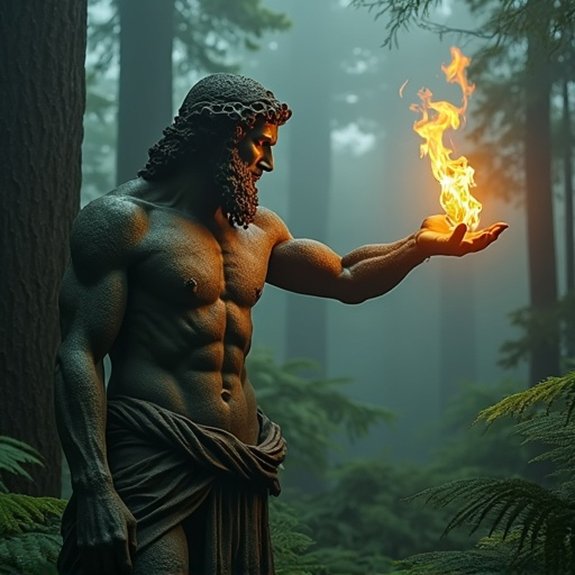Folklore of the First Fire (Prometheus, Etc)
Fire’s arrival in human hands wasn’t a gift—it was stolen. Across the world’s oldest stories, heroes and tricksters risked everything to snatch flames from jealous gods who’d rather keep humanity shivering in darkness. From Prometheus’s defiant theft to Māui’s cunning deception, these tales reveal something profound about humanity’s relationship with its most dangerous ally. But why do so many cultures insist fire had to be taken by force?
Introduction

Since humans first learned to control flames, fire has burned at the heart of mythology and folklore across every culture on Earth. Fire’s dual nature—both life-giving and destructive—has inspired countless stories explaining how humanity acquired this transformative power. These tales often feature divine theft, cunning tricksters, or benevolent gods who take pity on cold, struggling mortals.
The Greek myth of Prometheus stands as perhaps the most famous fire-origin story in Western culture, but it’s far from unique. Indigenous peoples worldwide have crafted their own narratives: Native American tribes speak of Raven stealing fire from the sun, while Aboriginal Australians tell of the rainbow bird carrying fire sticks to humanity. These stories don’t just explain fire’s origins—they explore themes of sacrifice, rebellion, and the price of knowledge.
Ancient Greek Titan’s Theft
Among all fire-theft myths, Prometheus’s defiance of Zeus has shaped Western literature and thought for over two millennia. The Titan’s compassion for humanity drove him to steal fire from Mount Olympus, hiding it within a fennel stalk. He’d witnessed mortals shivering in darkness, eating raw flesh, and dying from cold. His gift transformed their existence—they could now cook food, forge tools, and survive harsh winters.
Zeus’s fury was swift and merciless. He chained Prometheus to a Caucasus mountain peak where an eagle devoured his regenerating liver daily. The punishment lasted centuries until Heracles finally freed him. Yet Prometheus’s sacrifice wasn’t forgotten. The stolen fire became civilization’s foundation, enabling progress from primitive survival to advanced society. His rebellion established the archetype of the benefactor who suffers for humanity’s advancement.
Notable Cases or Sightings

While Prometheus remains mythology’s most celebrated fire thief, countless cultures have documented their own tales of beings who brought flame to humanity. The Māori tell of Māui, who wrestled fire from his grandmother’s fingernails in the underworld. Cherokee tradition credits Grandmother Spider with stealing fire from the sun, carrying it back in her web. Australian Aboriginal stories describe the fire-hawk, who snatched burning sticks to spread bushfires for hunting.
In Hindu mythology, Mātariśvan brought fire from heaven to earth, paralleling Prometheus’s deed. The Algonquin speak of Rabbit’s dangerous journey to steal fire from the weasels. Africa’s San people recount how Mantis stole fire from the ostrich, who’d hidden it under her wing. These stories aren’t mere folklore—they’re humanity’s attempt to explain civilization’s most transformative discovery.
Common Theories or Explanations
These universal fire-theft myths share striking similarities that anthropologists can’t ignore. Scholars propose several theories to explain why cultures worldwide developed parallel narratives about stealing fire from divine beings.
The practical theory suggests early humans recognized fire’s transformative power—it cooked food, provided warmth, and offered protection. This revolutionary technology seemed so miraculous that people couldn’t imagine discovering it independently; surely it must’ve been stolen from gods.
Jung’s collective unconscious theory argues these myths emerge from shared human psychology. Fire represents consciousness, enlightenment, and civilization’s spark. The theft symbolizes humanity’s rebellion against nature and the painful price of knowledge.
Environmental theorists point to volcanic activity and lightning strikes as inspiration. Ancient peoples witnessed fire’s celestial origins and crafted stories explaining how humans acquired this heavenly element.
Frequently Asked Questions
How Do Different Cultures Punish or Reward Their Fire-Bringers in Mythology?
Different cultures treat their fire-bringers variably. Greeks punished Prometheus with eternal torment. Native American traditions often honor their fire-bringers as heroes. Polynesian Maui’s celebrated despite trickery. Chinese culture reveres fire-discoverers as civilization’s founders.
What Rituals or Festivals Celebrate the Mythical Acquisition of Fire Today?
Several cultures maintain fire festivals celebrating mythical fire acquisition. Greeks honor Prometheus during Prometheia. Zoroastrians celebrate Sadeh marking fire’s discovery. Many indigenous peoples perform new fire ceremonies that reenact their ancestors’ first receiving of sacred flames.
Are There Female Fire-Bringer Figures in World Mythology?
Yes, several female fire-bringers exist in world mythology. Maui’s grandmother Mahuika guards fire in Polynesian tales, while Aboriginal Australian stories feature fire-stealing crow-women. Greek mythology includes Hestia, who maintains humanity’s sacred hearth flames.
How Has the Prometheus Myth Influenced Modern Literature and Film?
Prometheus’s defiant gift of fire has shaped countless modern works. Mary Shelley’s “Frankenstein” explores dangerous knowledge, while films like “Blade Runner” examine creation’s consequences. His rebellion against authority resonates throughout science fiction’s technological warnings.
What Animals Besides Eagles Appear in Fire-Theft Myths Worldwide?
Various animals help or hinder fire theft in global myths. Coyote steals fire in Native American tales, spiders carry it in African stories, rabbits run with burning sticks in southeastern tribes’ legends, and jaguars guard it.


